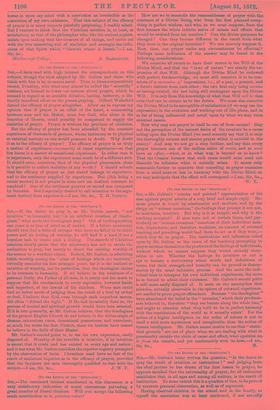[TO THE EDITOR OF THE "SPECTATOB.1
Galton's "concise and pointed" representation of his. case against prayer admits of a very brief and simple reply. Be- cause prayer is taught by missionaries and mothers, and by the clergy on "solemn occasions," the feelings that prompt it are not,. he maintains, intuitive. But why is it so taught, and why is the accepted? If men were not at certain times, and par- ticularly on "solemn occasions," conscious of their individual isola- tion, dependence, and therefore weakness, no amount of external, teaching and preaching would lead them to act as if they were,— which they do in prayer. The institutions and influences relied upon by Mr. Galton as the cause of the tendency prompting to, prayer are thus themselves the products of the feelings of individuals, without which we cannot suppose they would embody them- selves in act. W.hether the feelings be intuitive or not in- apt to become a controversy about words and definitions ofi terms, but their strength and tenacity can be proved to demon- station by the usual inductive process. And the more the indi- vidual tries to interpret his own individual experiences, the more is forced to admit their existence. Mr. Galton's second point is still more easily disposed of. It rests on the assumption that miracles, actually observable in the sphere of outward experience, are needed to prove prayer efficacious. Because "the theologians' have abandoned the belief in the" miracles," which their predeces- sors believed in, therefore "they are beaten along the whole line," and ought to abandon what they hold to be in perfect harmony with the constitution of the world as it actually exists ! For the- action of a higher intelligence on the order of nature is not in, itself a whit more mysterious and inexplicable than the action of human intelligence. Mr. Galton seems unable to see that "statis- tical grounds" are out of place when we are dealing with what is. presumably outside the circle of cause and effect, what operates on. it from the outside, and yet conformably with its laws.—I am,.


































 Previous page
Previous page